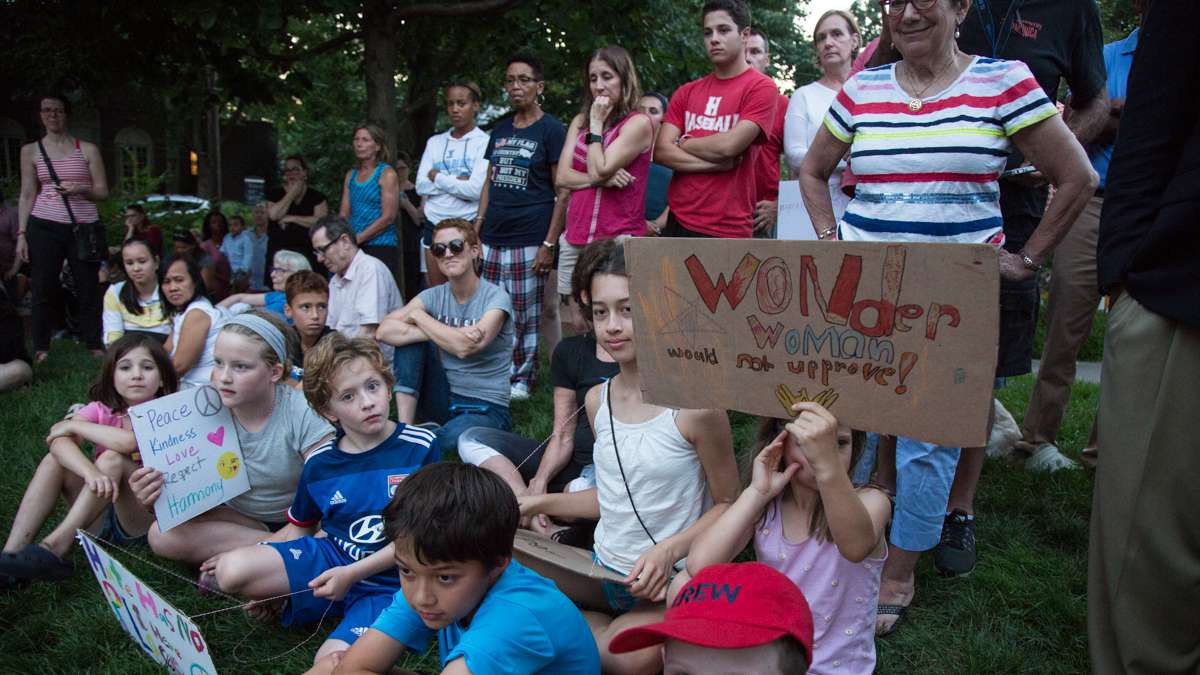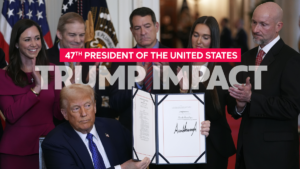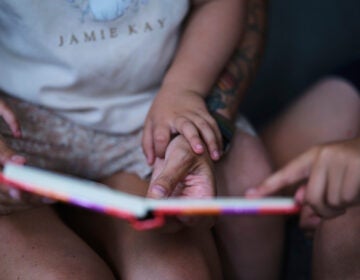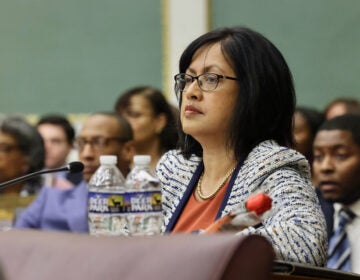Four tips for talking to kids about Charlottesville
Listen 2:11
Blessing Osazuwa, a 19 year old from Ardmore, put together a rally to 'Stand up for Love' to remind her neighborhood and the country that white supremacy is unacceptable in response to the violence in Charlottesville, Va. Representatives from the district and other local figures gave uplifting speeches to the hundreds gathered at Linwood Park in Ardmore, Pa. on August 13th 2017. (Emily Cohen for NewsWorks)
After the tragic events in Charlottesville, Virginia, some parents are struggling to explain hate groups such as neo-Nazis or the Ku Klux Klan and racially motivated violence to their children. Experts say the answer lies in honest, simple conversations while conveying affection and a desire to protect.
1. Sort out your own feelings first
Howard Stevenson is a clinical psychologist and professor at the University of Pennsylvania who helps families talk to their kids about race. He’s also a parent and an African-American, and he’s had to have many tough conversations with his kids over the years.
“I … felt compelled to talk to them about race, racial politics on the streets … as well as how some people might see them not as lovable or adorable as I do,” he said.
In the wake of racially charged events involving violence, Stevenson said parents have to sort out their own feelings first.
“It’s hard sometimes to come up with the right thing to say because you’re both traumatized and trying to be helpful,” he said.
2. Explain what’s happening in your own words
After processing those feelings, parents should explain what’s happening in their own words and start with what kids know. Some children are aware of the civil rights movement and slavery — that awareness is a good place to build on.
“I think the idea that this is not new is an important statement for young people,” Stevenson said.
Knowledge of the history of racism in America places what is happening today in context and makes kids aware that the violence isn’t their fault or about something wrong with them.
Each message from parents should convey three things: affection — that sense of “I love you” and “I worry; protection — “I want to keep you safe;” and correction — making sure the child accurately understands what’s going on.
Stevenson said parents can explain why racist ideologies come about and spread — for example, they can explain concepts such as scapegoating — but it’s important to follow the child’s lead.
“Most of what you want parents to be prepared for is that children will have their own questions that force you to go deeper,” he said.
3. Help kids avoid internalizing someone else’s hatred
If the child is part of a targeted group, it’s important to make sure he or she doesn’t feel like someone’s ideology is their fault.
Parents have to make clear that “it’s not about how handsome you are or how pretty or how smart,” said Stevenson. “It’s just a matter that some people don’t define you as human and that you’re a threat to them and that they will do whatever they need to do to protect themselves. And, luckily, we think it’s a minority of people but unfortunately has been growing.”
Tamar Chansky, a psychologist in suburban Philadelphia, agreed.
“Children need to be grounded in their own sense of themselves, their own history, their values and that whatever other people think about them or say about them has nothing to do with who they are,” she said.
For families who are not the targets of hate groups, Stevenson and Chansky said, the conversation is different, but also necessary.
White families tend to socialize their kids around race less directly, Stevenson said.
“They might even encourage their children to behave by ignoring something, so as to not cause more trouble for someone or for themselves, or to … be silent,” he said. “The research supports the notion that the more information that young people get around racial matters, the less confused they are and the less they’re feeling helpless.”
That’s why all parents should actively talk to their kids about race, Stevenson said.
4. Encourage your children to be allies
And parents can encourage kids to be good allies to their friends.
“If kids are not directly being targeted or persecuted, we can empower them to take action, to stand up to bullying safely and treat people with kindness,” said Chansky. “They can go out in support of their friends — or people in their community who are vulnerable in these situations — and go to marches or vigils.”
When it comes to consuming media, Stevenson said it’s good to teach children to critique the commentary they see on TV and to question the decision for news organizations to refer to white nationalists and neo-Nazis as “the alt-right.”
Chansky added that there comes a time to turn off the news and to connect with one another device-free.
“Watch the news together, but don’t have it on all the time,” she said. “Connect with your kids.”
WHYY is your source for fact-based, in-depth journalism and information. As a nonprofit organization, we rely on financial support from readers like you. Please give today.





